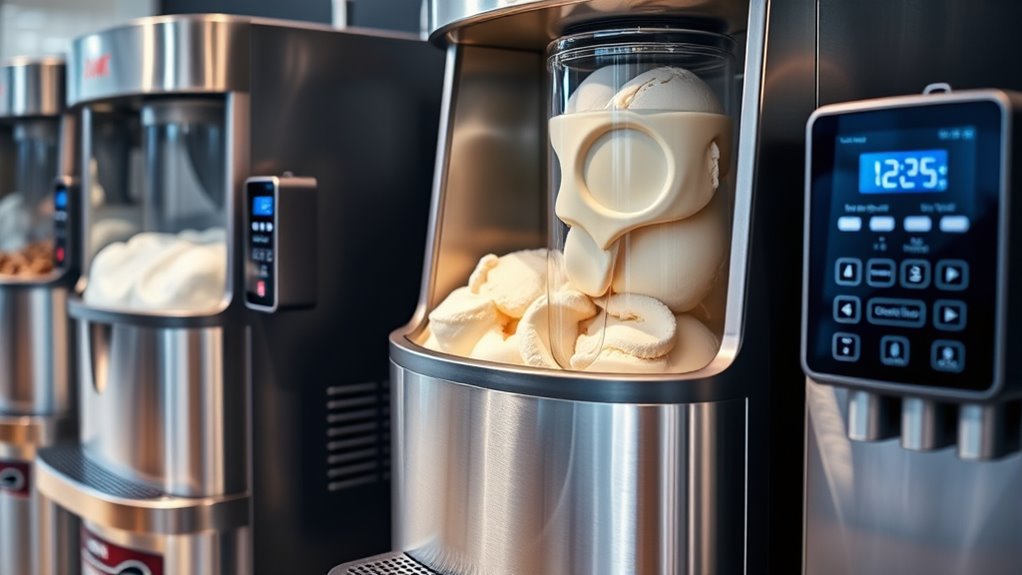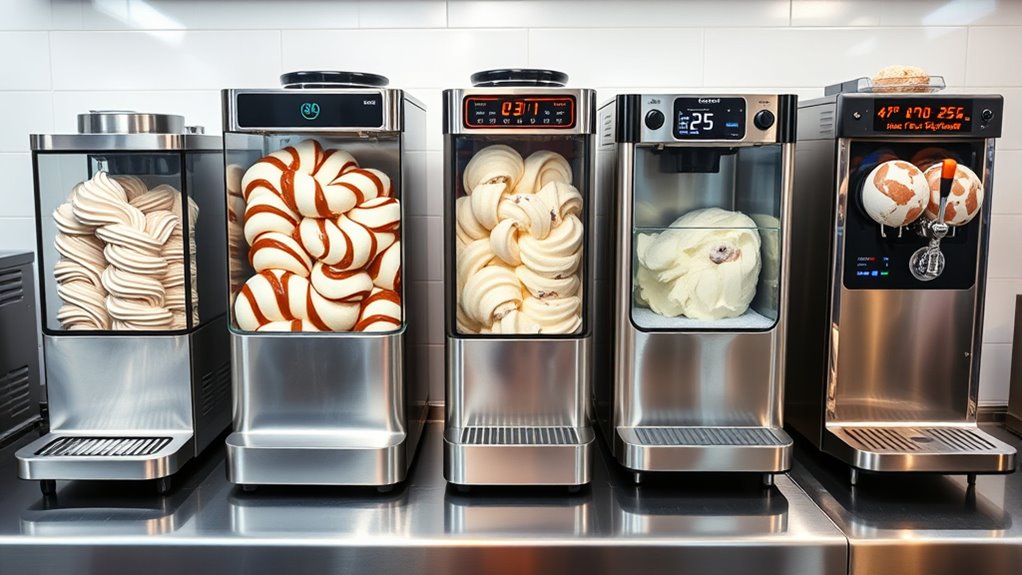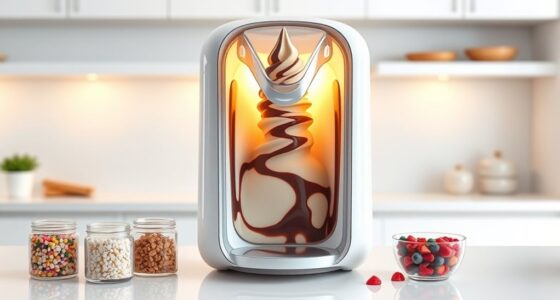When choosing a commercial ice cream machine, consider your production volume and dessert type. Soft serve machines are perfect for quick, creamy servings with on-demand freshness, while batch freezers suit larger quantities and gelato or sorbets. Continuous systems support fast service, whereas batch models offer more control over texture and flavor. To find the best fit for your needs, explore further details on features, maintenance, and operation—your ideal machine might just be a step away.
Key Takeaways
- Choose soft serve machines for quick, on-demand dessert prep, ideal for high-volume, fast service environments.
- Opt batch freezers for larger quantities and diverse flavors like gelato or sorbet, offering greater control over texture.
- Consider continuous freezing systems for high-speed production, ensuring consistent quality in busy outlets.
- Prioritize machines with easy cleaning and maintenance features to ensure reliability and minimize downtime.
- Match machine type to your menu, volume needs, and operational capacity for optimal efficiency and customer satisfaction.

Have you ever wondered how large-scale ice cream shops and restaurants produce their creamy, delicious treats so efficiently? The secret lies in the type of commercial ice cream machine they use. These machines are specially designed to handle high-volume production, ensuring you get your favorite frozen dessert quickly and consistently. But choosing the right machine depends on understanding the different types available and their specific features.
Large-scale ice cream shops rely on specialized machines for efficient, high-volume production.
When it comes to frozen dessert, the machine’s ability to produce smooth, scoopable ice cream depends heavily on proper machine maintenance. Regular cleaning and servicing prevent buildup of ice, ensure the temperature stays consistent, and help avoid breakdowns. Keeping the machine in top condition not only extends its lifespan but also guarantees the quality of each batch. Neglecting maintenance can lead to spoilage, uneven texture, and costly repairs, so it’s vital to weigh the manufacturer’s guidelines for cleaning and upkeep.
There are generally two main types of commercial ice cream machines: soft serve and batch freezers. Soft serve machines are popular in many eateries because they produce creamy ice cream on demand, allowing quick service with minimal fuss. These machines often have a built-in refrigeration system that maintains the ideal temperature for soft serve consistency. Batch freezers, on the other hand, are designed for producing larger quantities of ice cream at once, which is ideal for shops with high customer volume or for making specialty frozen desserts like gelato or sorbet. They require more space and time but give you more control over texture and flavor.
Another factor to weigh is the type of freezing mechanism. Some machines use continuous freezing, where the mixture is constantly churned and frozen simultaneously, ideal for soft serve. Others use batch freezing, where the mixture is frozen in batches, then scraped and packed. The choice depends on your specific needs, menu offerings, and production pace.
No matter what type you go for, machine maintenance remains a critical aspect. Regularly inspecting parts like blades, seals, and refrigeration components ensures smooth operation. Proper calibration of temperature settings prevents over-freezing or melting, maintaining the quality of your frozen desserts. Well-maintained equipment reduces downtime and keeps your production running seamlessly, allowing you to serve high-quality ice cream consistently. So, when selecting a commercial ice cream machine, prioritize maintenance features, ease of cleaning, and reliability, because these factors directly influence your ability to serve perfect frozen desserts every time.
Frequently Asked Questions
What Maintenance Is Required for Commercial Ice Cream Machines?
You need to keep your commercial ice cream machine in top shape by following regular cleaning schedules to prevent bacteria buildup. Make sure to thoroughly clean all parts that contact food and sanitize them daily. Additionally, check lubrication requirements, such as greasing moving parts as recommended by the manufacturer, to guarantee smooth operation. Proper maintenance helps extend your machine’s lifespan and guarantees delicious, safe ice cream for your customers.
How Energy-Efficient Are Different Ice Cream Machine Models?
Think of your ice cream machine as a car—some models sip energy like a hybrid, while others guzzle like a gas guzzler. Modern machines with green technologies cut energy consumption considerably, saving you money and reducing your carbon footprint. On average, energy-efficient models use 20-30% less power, making them a smart choice for eco-conscious businesses. Choosing the right machine can help you keep cool and stay green at the same time.
Can Commercial Ice Cream Machines Make Other Frozen Desserts?
You can definitely use commercial ice cream machines to make other frozen desserts like frozen yogurt and gelato. Many models, especially gelato machines, are versatile and designed to handle different textures and ingredients. By adjusting the settings, you can produce smooth, creamy frozen yogurt or rich gelato. Just guarantee your machine is compatible with these recipes, and you’re ready to expand your dessert menu with a variety of frozen treats.
What Is the Typical Lifespan of a Commercial Ice Cream Machine?
You might wonder about the typical lifespan of a commercial ice cream machine. Generally, with proper maintenance, these machines offer good machine durability, often lasting 5 to 10 years. The key is component longevity; high-quality parts and regular servicing help prevent breakdowns and extend their lifespan. By taking care of your machine, you ensure it stays efficient and productive, maximizing your investment over the years.
Are There Specific Cleaning Protocols for Different Machine Types?
You need to follow specific cleaning schedules and sanitization procedures for different machine types to guarantee safety and efficiency. Each machine may require unique cleaning agents and methods, so always consult the manufacturer’s instructions. Regularly disassemble components, clean thoroughly, and sanitize to prevent bacterial growth. Proper maintenance not only extends your machine’s lifespan but also guarantees high-quality ice cream and customer satisfaction.
Conclusion
Choosing the right commercial ice cream machine isn’t always a one-size-fits-all situation. You need to weigh your space, budget, and the kind of ice cream you want to serve. Remember, the devil is in the details, so don’t rush your decision. When you find the perfect fit, it’ll be smooth sailing from there. Keep your eyes on the prize, and you’ll scoop up success in no time.








